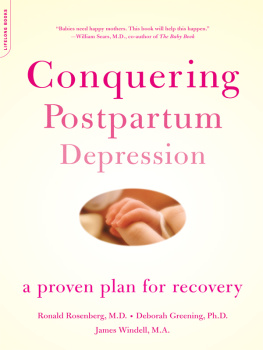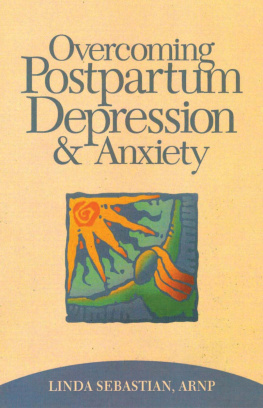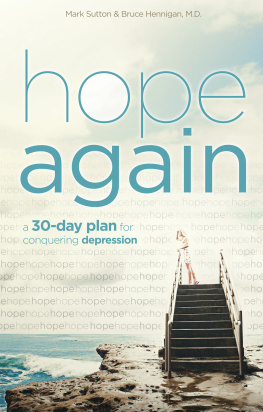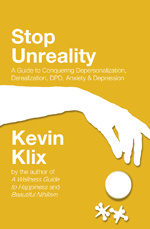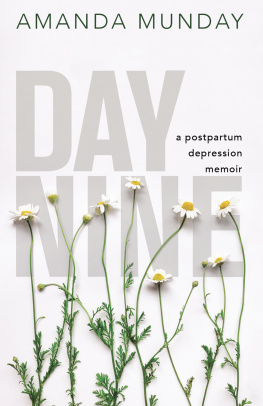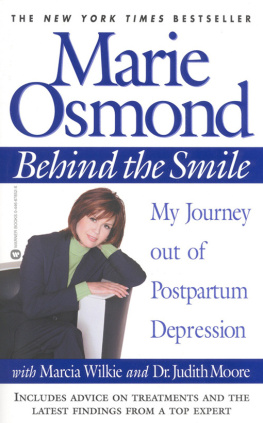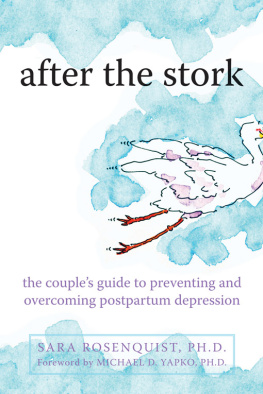Praise for
Conquering Postpartum Depression
The only word I could think of when reading this book was lifesaver. Women and their families will feel not only comforted by the up-to-date and practical information, but will feel that their lives will be saved by the knowledge that their symptoms can be so easily and successfully treated.
Alice Domar, Ph.D., author of Healing Mind,
Healthy Woman and Self Nurture: Learning to Care
for Yourself as Effectively as You Care for Everyone Else
This is certainly a book that will be on my bookshelf, and I will strongly recommend it as reading to any patient and her family dealing with postpartum depression. In this era of HMO medicine, few physicians devote the time needed to explain all the issues involved with this all-too widespread problem. This excellent book provides the extensive consultation that these women need.
Mary Jane Minkin, M.D.
This is a thoughtful, comprehensive, and user-friendly guide. Women struggling with postnatal mood disorders will identify with the case histories and find hope for their own recovery in the stories.
Anne Buist, MD, Director of the Australian
National Postnatal Depression Program
Babies need happy mothers. This book will help this happen.
William Sears M.D., co-author of The Baby Book
Conquering Postpartum Depression
Conquering
Postpartum
Depression
A PROVEN PLAN FOR RECOVERY
Ronald Rosenberg, M.D.
Deborah Greening, Ph.D.
James Windell, M.A.
Many of the designations used by manufacturers and sellers to distinguish their products are claimed as trademarks. Where those designations appear in this book, and where Da Capo Press was aware of a trademark claim, the designations have been printed in initial capital letters.
Copyright 2003 by Ronald Rosenberg, M.D., Deborah Greening, Ph.D., and James Windell, M.A.
All rights reserved. No part of this publication may be reproduced, stored in a retrieval system, or transmitted, in any form or by any means, electronic, mechanical, photocopying, recording, or otherwise, without the prior written permission of the publisher. Printed in the United States of America.
Text design by Brent Wilcox
Set in 11-point Simoncini Garamond by The Perseus Books Group
Cataloging-in-Publication data for this book is available from the Library of Congress.
First Da Capo Press paperback edition 2004
ISBN 0-7382-0951-1
eBook ISBN: 9780786730001
Published by Da Capo Press
A Member of The Perseus Books Group
http://www.dacapopress.com
Da Capo Press books are available at special discounts for bulk purchases in the U.S. by corporations, institutions, and other organizations. For more information, please contact the Special Markets Department at the Perseus Books Group, 11 Cambridge Center, Cambridge, MA 02142, or call (800) 2551514 or (617) 2525298, or email special.markets@perseusbooks.com.
1 2 3 4 5 6 7 8 908 07 06 05 04
For Jane and Jonathan
JW
For my children Ethan, Ellie, Drew, and Kate;
and in memory of Steven Bendix, M.D.
RR
For my girls: Shannon, Mary Anne, Joni, Katy, Abigail, and Megan;
and for my parents, Betty and Bill
DG
Acknowledgments
No book is a product of the authors alone. This is certainly true of this book as there are a number of people who assisted us, both directly and indirectly.
We would like to thank Dr. Alan Rosenbaum for his longtime commitment to womens health care, and kindness in mentoring us and providing a comprehensive treatment environment that gave us a start. Furthermore, Dr. Rosenbaum deserves special recognition because he has been instrumental in bringing the psychopharmacological treatment of women to the forefront in metropolitan Detroit.
Dr. Lee Cohen, director of reproductive psychiatry at Massachusetts General Hospital, has been a source of inspiration because of his excellence in providing care and research in postpartum depression.
The American College of Obstetricians and Gynecologists also deserves thanks for their dedication to the health care of women.
Marie Osmond deserves a standing ovation for bringing her own story of postpartum depression to the awareness of countless women who needed someone to speak out and describe what it feels like to live through postpartum depression.
There are a number of people who generously provided us support and their own personal stories throughout the writing of this book. In particular we would like to thank Karen Schroeder; the staff at the Beaumont Hospital Parenting Center in Royal Oak, Michigan, which includes Beth Fryblewicz, Deanna Robb, and Julie Kouziak; and Vickie Rupert, Katie Conti, and Deb Farwell. We want to thank many other people whom we could never begin to name. However, these women and their husbands were open and honest in sharing aspects of their personal lifeall with the intention of helping other women and families. The women who allowed us to use their quotes and their often painful personal situations in the writing of this book deserve our special gratitude.
We want to thank the many obstetricians and gynecologists in the Detroit area who are compassionate, caring, and willing to listen to their patients and to send those patients for treatment. And we want to thank all of those people in the health care community for their receptivity to our team approach to treating postpartum depression.
Finally, we want to thank our agent, Denise Marcil, who believed in this book from the beginning, and to our editor, Marnie Cochran, who was the intellectual midwife who has helped to shape it into the story we wanted to tell.
Authors Note
Its often difficult to determine how it is that people with diverse backgrounds come together to work as a team with a common cause. Were not exactly sure why our paths were destined to cross and how it was that we ended up in the same place, but thats exactly what happened. And were not just talking about our work with postpartum depressionall three of us authors, remarkably, live in the same neighborhood.
It might be destiny, but the fact is we each took different roads in order to end up together helping women and their families overcome postpartum depression (PPD). For example, Ron Rosenberg remembers exactly what case represented a turning point in his professional life when he was practicing as an obstetrician and gynecologist. The day after Ron delivered Samanthas baby, he stopped in her hospital room to see how she was doing. Samantha was not doing well at all. She was severely depressed and talking in a way that frightened Ron. He immediately transferred her to the psychiatric ward of the hospitala move that was not only extremely unusual at the time, but highly criticized. There she was treated with medication and within a few days was able to go home and care for her baby.
Three years later, Samanthas husband made an appointment at Rons office to talk. He said he came to thank him for saving the lives of both his wife and his child. It was that thank you from a husband and father that galvanized a thought that had been circling in Rons head for a few years into a plan of action. He would return to a second residency and become a psychiatrist.
I knew that as a psychiatrist I could do more for depressed mothers than I could as an obstetrician, Ron says. They needed someone to listen to them and take their emotional needs seriously.

